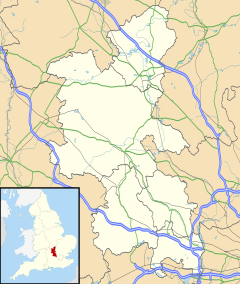Newton Blossomville
 From Wikipedia the free encyclopedia
From Wikipedia the free encyclopedia
| Newton Blossomville | |
|---|---|
 | |
Location within Buckinghamshire | |
| Population | 329 (2011 Census)[1] |
| OS grid reference | SP925515 |
| Civil parish |
|
| Unitary authority | |
| Ceremonial county | |
| Region | |
| Country | England |
| Sovereign state | United Kingdom |
| Post town | BEDFORD |
| Postcode district | MK43 |
| Dialling code | 01234 |
| Police | Thames Valley |
| Fire | Buckinghamshire |
| Ambulance | South Central |
| UK Parliament | |
Newton Blossomville is a village in the unitary authority area of the City of Milton Keynes, Buckinghamshire, England. It is a civil parish, sharing a joint parish council with Clifton Reynes.[2] At the 2011 census, the population of the parish was 329,[1] an increase of 17.5% on the 280 figure for 2001[3]
It is located in the north of the Borough, about 2.5 miles (4.0 km) east of Olney, 8 miles (13 km) west of Bedford, and 9 miles (14 km) north-east of Central Milton Keynes, close to the Bucks/Beds border.
History
[edit]The village name 'Newton' is an Old English language word meaning 'new village' or 'new homestead'.[4] It was recorded in the Domesday Book of 1086 under the holdings of Clifton Reynes (Clystone) as not much was left of the original settlement. Called 'Neutone' when first named independently in 1175,[5] it gained the affix 'Blossevill', referring to the family name of the lords of the manor in the 13th century.[5]
In 1419, it appears as "Newenton Blosumvyll".[6]
Listed buildings and structures
[edit]The parish has one scheduled ancient monument,[7] one grade II* listed building,[8] and 14 at grade II.[9]
Services
[edit]
Today, the only service remaining in the village is the Newton Blossomville Church of England First School. The village post office has been closed for many years, as is common for other villages of this size. The nearest railway station, Turvey, was closed when the Bedford to Northampton Line was closed in the 1960s. For a brief time the new diesel engines were tested along the railway. Some of the line remains but much is unused and overgrown or incorporated into the adjacent fields. Although, a section is used as private access to Newton Lodge Farm in Spring Lane, Clifton Reynes, coming off Clifton Road, to the west of the remains of the Clifton Road railway bridge, where once a track with a railway crossing used to run to "Costerpits Farm" (now a residential barn conversion).
Notable former inhabitants
[edit]References
[edit]- ^ a b UK Census (2011). "Local Area Report – Newton Blossomville (E04001266)". Nomis. Office for National Statistics. Retrieved 19 November 2019.
- ^ Parishes in Milton Keynes Archived 2009-06-08 at the Wayback Machine - Milton Keynes Council.
- ^ Population of the village (Page 22) Archived 11 September 2006 at the Wayback Machine Milton Keynes Council
- ^ "Key to English place names". Institute for Name-Studies, University of Nottingham. Retrieved 11 April 2022.
- ^ a b Page (1927), p. 422.
- ^ The Court of Common Pleas; National Archives; ref: CP40/634; image seen at: http://aalt.law.uh.edu/H5/CP40no634/aCP40no634fronts/IMG_0771.htm (last entry, with county margin: Buk for Buckinghamshire)
- ^ Historic England. "Roman villa 300m south east of Newton Lodge Farm (1014794)". National Heritage List for England.
- ^ Historic England. "CHURCH OF ST NICHOLAS, HIGH STREET (1212987)". National Heritage List for England.
- ^ "1Search Results for 'Newton Blossomville'". Historic England. Retrieved 1 August 2024.
Sources
[edit]- Page, William, ed. (1927). "Parishes : Newton Blossomville". A History of the County of Buckingham. Victoria History of the Counties of England. Vol. 4. London: Constable & Co. Ltd. pp. 422–425.
External links
[edit]- Twenty-five inch historic mapping
- Ordnance Survey (1900). "Buckinghamshire II.16" (Map). OS 25 inch England and Wales, 1841-1952. 1:2,500. Ordnance Survey – via National Library of Scotland. (Cold Brayfield and north side of Newton Blossomville.)
- Ordnance Survey (1882). "Buckinghamshire V.4 & VI.1" (Map). OS 25 inch England and Wales, 1841-1952. 1:2,500. Ordnance Survey – via National Library of Scotland. (South side of Newton Blossomville, including railway line.)
![]() Media related to Newton Blossomville at Wikimedia Commons
Media related to Newton Blossomville at Wikimedia Commons

